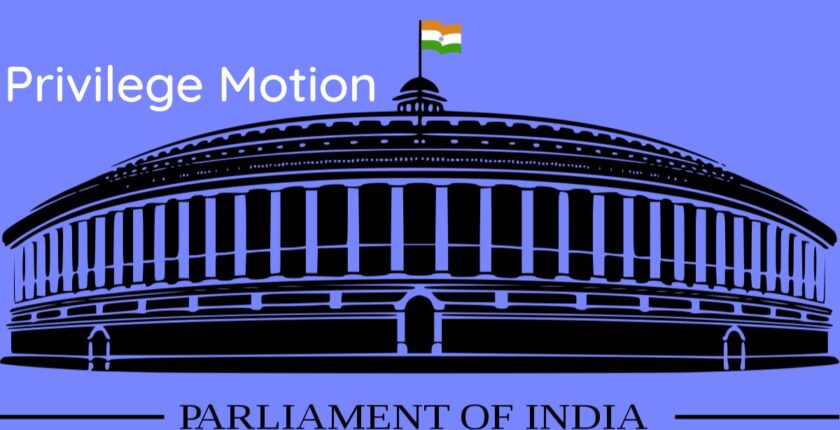New Article
Privilege Motion
- March 18, 2023
- Posted by: Admin
- Category: Current Affairs BPSC Indian Nation and State Current Affairs Indian Polity MP Patwari Exam MPPSC State PSC Exams UPPSC UPSC

Privilege Motion
The privilege motion is moved by a member who believes that a minister or another member has violated the privilege of the House or one or more of its members by withholding relevant facts or by providing inaccurate or distorted information. The privilege motion will be covered in-depth in this article. It is a crucial subject in light of the upcoming UPSC 2023 exam.
What is Privilege Motion?
Members of Parliament are granted various rights, both individually and collectively, in order to carry out their duties effectively. Yet, it is deemed a breach of privilege and is punishable under parliamentary laws if any member disregards or misuse any of these rights or privileges.
Members of the Lok Sabha and the Rajya Sabha may initiate a privilege motion against the accused members if they discover that another member or members have violated the motion.
What exactly is Parliamentary Privilege?
- The term “privilege” refers to a set of privileges enjoyed by each House of Parliament, its Committees, and the individual members of each House, without which they would be unable to carry out their duties effectively and efficiently.
- Parliament’s freedom, power, and dignity are to be protected by parliamentary privilege.
- Yet, they are only accessible to individual members inasmuch as it is required for the House to operate freely and without any restrictions.
- Privileges of Parliament do not place a member of Parliament on a different footing than an ordinary citizen in the application of legislation unless there are good and substantial reasons in the interest of Parliament itself to do so.
- The following are some of the more significant privileges each House of Parliament, its members, and Committees enjoy:
- Speech freedom in the Parliament,
- a member’s immunity from legal action in any court related to statements made or votes cast in Parliament or a committee thereof,
- Immunity from proceedings in any court arising from the publication of any report, paper, votes, or proceedings by or under the authority of either House of Parliament, restriction on courts inquiring into Parliamentary proceedings, and
- Members are not subject to arrest in civil matters while the House is in session, as well as for forty days prior to and for forty days following it.
The privilege of being free from arrest, however, does not include preventative arrest or detention under statutory authority by executive order or in criminal situations.
loksabhaph.nic.in (Source)
Breach of Privilege Motion
- Any violation of an MP’s or Parliament’s privilege is a breach of privilege.
- The Privilege Motion is discussed in Chapter 20 of Rule 22 for the Lok Sabha and Chapter 16 of Rule 187 for the Rajya Sabha.
- The Speaker oversees the investigation into any violations of this resolution in the Lok Sabha, while the Chairperson oversees it in the Rajya Sabha.
- The accused is called to the stand once the Speaker or the Chairman determines that the accusations are true.
- The Speaker of the Lok Sabha elects a committee of 15 members, and the Chairperson of the Rajya Sabha elects a committee of 10.
- These committees are in charge of handling all the cases and allegations pertaining to the privilege motion and taking the necessary counteractions and motion breaches.
Cases of Privilege Motion
Many complaints on the violation of the privilege motion have been made. A few examples have received a fair amount of media attention. Here are a few of the most significant ones:
- The state minister for parliamentary affairs has proposed a privilege motion calling for the suspension of Trinamool Congress MP for the remainder of the current session. The Rajya Sabha’s chairmen have given their approval to this move.
- A breach of privilege motion was previously passed against the country’s Prime Minister and Defense Minister, alleging that they had misled Parliamentarians about the Rafale fighter jet sale.
- The most major privilege motion against Indira Gandhi was adopted in 1978. The motion was approved by Charan Singh, the then-home minister, who cited atrocities committed by the petitioner during the Emergency. After being adjudicated guilty, she was expelled from the House.
There have been numerous additional examples reported, and many of them have been rejected by the committees of both Houses of Parliament. The primary goal of the privilege motion was to prevent any Minister from abusing his authority once he obtained the privileges of someone with higher authority.
Read More: MPPSC Free Study Material (English/Hindi)
MP PATWARI NOTES AND STUDY MATERIAL: HINDI AND ENGLISH PDF
🤩Follow Our Social Media Handles
YouTube 👉 https://bit.ly/36wAy17
Telegram👉 https://bit.ly/3sZTLzD
Facebook 👉 https://bit.ly/3sdKwN0
Daily Current Affairs Quiz for UPSC, MPSC, BPSC, and UPPSC: Click here
Frequently Asked Questions:
Does the Constitution mention the Privilege motion?
Article 105 of the Constitution deals with the powers, privileges and immunities of either House of the Indian Parliament and its Members and committees. Chapter 20 of rule 22 for Lok Sabha and Chapter 16 Rule 187 for the Rajya Sabha have mentioned the Privilege motion.
What are the Types of Motion in the Parliament?
The types of Motion are: Adjournment Motion, Call-Attention Motion, Censure Motion, Closure Motion, Cut Motions, Motion of Thanks, No Date Yet Named Motion, Privilege Motion, No Confidence Motion.

